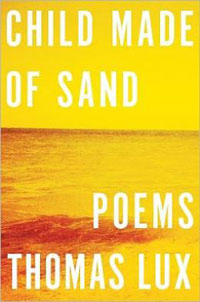Writing That Makes You Feel Like You’re Being Groomed
***
When John Ebersole reads work he terms “Grocery Store Poetry” (GSP – which includes also, for John, Linda Pastan, Billy Collins and, most immediately, present-day Thomas Lux) he says “I also get the sick feeling like I’m being groomed.” This quote comes from a little Q and A I recently did with John because when I read his review of the new Thomas Lux book (you can read it here on HTMLGIANT) I was struck by (hello, Paul Cunningham) how upset, how disturbed John seemed to be. And this reminded me of how I feel when I read certain people. Disturbed. And sometimes, for sure also, like I’m being groomed. (shiver, shiver).
This is particularly the case when I read Whitman and experience not just the great POETRY but also the feeling of a clammy arm slipping around me over and over in a cheap movie theater, of a pale tongue in my ear, of a breathy voice trying to massage my entire being into submission. Nice, easy and compliant. And that’s creepy, yeah. And creepy, also, to think (and know) that while I’m reading Whitman and experiencing the tremendous virtuosity of imagination and spirit that a part of him’s masturbating in the row behind me.
But, you know what, it’s ok, because it’s Whitman and I accept the fact that he’s grooming me. That he wants and needs me to surrender to his voice, his work, his divine right (yeah, he thought he was a new Jesus for America). But, for Christ’s Sake, we’re talking now about writing like late-career Thomas Lux!
***
Rauan: I believe you’re suggesting that “Grocery Store Poetry” written by Lux, Pastan, Collins, etc, isn’t attractive and vital because even though the world’s always been in turmoil “the way we apprehend that turmoil has changed and changed dramatically.” And you’re suggesting then I think that we need more a riskier, stronger sort of poetry (a poetry of derangement?) because “globalization and the relentless whiplashes of information rearrange us.” Your thoughts on this please?
John: Wittgenstein once wrote – I’m fucking kidding. I’m less READ MORE >
October 12th, 2013 / 1:12 pm
Thomas Lux’s Child Made of Sand
 Child Made of Sand
Child Made of Sand
by Thomas Lux
Houghton Mifflin Harcourt, 2012
80 pages / $23 Buy from Amazon
Does anyone read Thomas Lux anymore? I tweeted this question and no one really answered me. In my teens and twenties I associated Thomas Lux with poetry royalty, standing abreast with the likes of Tate and Ashbery. But now? I don’t know. When I regularly read Lux I was getting ______ all the time and reading One Hundred Years of Solitude and doing backstrokes in David Lynch. So when Lux’s new book of poems, Child Made of Sand (a title I love by the way), came out I sort of just shrugged. But that seemed rude and dismissive, so I decided to take a look at it and I found exactly what Lux has been known for all these years: witty, learned, half-surreal poems. Which is fine. It’s fine if Bill Clinton was still president and the most pressing political issue facing us was a blue dress. But now we live in a time of endless war, economic injustice, a polarized media, the mind-F that is the Internet, never mind scores of DIY parents with advanced degrees not vaccinating their children. Somehow, Lux’s neighborly tone is sort of mesmerizingly off-putting, especially since as I write this the Syrian government is bombing its own citizens with chemical weapons:
You do: one side rolls left,
the other right, and both
show you the chambers
of their split hearts, their slippery liquids,
and seeds,
which you take, eat,
because of their abundance.
Across a small pond
a boy squats by the edge
stirring the water with his hand.
His father’s five strides behind,
too far to stop him if he topples face-first.
The water is black but shallow.(from “From Whom All Blessings Flow”)
It certainly is, Mr. Lux, it certainly is. This pleasant free-verse is as harmless as Seth Abramson, but equally annoying, and seems out of step with the rest of us. Many aging poets, once someone confirms their place in the pantheon of contemporary American poetry, seem to have earned the right to write mediocre verse without any accountability. Recently, I came across a poem by Linda Pastan called “3AM” in the Gettysburg Review (Winter 2012) that shocked me for its banality and I can’t imagine why the editors published it except out of some obligatory gratitude for years of service. Who hasn’t in high school written a poem titled “3AM”? What’s interesting is that this sort of poetry wasn’t offensive at some point precisely because it reflects great prosperity and privilege. Coming across the Pastan poem as the world here and abroad comes apart at the seams is unnerving. Lux, and other poets sympathetic to this sort of suburban disposition (disclaimer: live in suburbs/own Crocs), would rightly argue that the world is always in turmoil. When is it not? And I agree. But the way we apprehend that turmoil has changed and changed dramatically. Besides, as globalization and the relentless whiplashes of information rearrange us, these poets are entering the twilight of their careers. And yet perhaps they have contributed enough? Perhaps they should be allowed to frolic peacefully in the shade of an oak tree and scribble in paper. In short, respect your elders. But perhaps, just perhaps critics should hold these AARP poets even more accountable than younger poets. The premise that the older you get, the less impact you have is a false one. Take a look at the Senate. According to Slate.com the average age of a Senator is 62. And that was in 2011. So, instead of hiding older poets like heirlooms, tug them back into the light of this world.
September 30th, 2013 / 11:00 am


